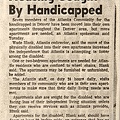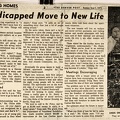Rocky Mountain News - Saturday June 7, 1975
continued from page 55 [we don't have first part of this article]
2 PHOTOS by Bill Perry: Top photo of someone sitting in a wheelchair by a window. There is a TV set and other furniture, and in the foreground, the wheel of another wheelchair. Bottom photo of what appears to be the same room, with two people in wheelchairs facing one another, talking.
Caption reads: Kathy Vincent talks with Glenn Kopp, one of two executive directors of the Atlantis project, in one of remodeled apartments.
[Headline] Atlantis offered for handicapped
SAID GLENN KOPP, one of two executive directors of the project, and himself confined to a wheelchair: “You have to be in a wheelchair to realize the specific needs of the handicapped.”
Under the direction of those who will live at Atlantis, doorways were widened, entrance and exit ramps installed, ovens and stoves made more accessible, disposal units moved down and doorsills made flush with flooring, among other things.
"We want to push people out a bit on their own," said Kopp. “So far as we know, this is the first project of its type in the United States.
The entire project, too, is financially feasible for its handicapped residents. Most receive state grants of $155 a month for living expenses, and can apply for and receive another $217 per month to pay for needed attendants.
WHILE NOT a great deal of money, the combined dollars from two young adults sharing an apartment make the plan workable.
And plans now call for many more apartments to be converted. Some $82,500 in pre-planning money already is available, and co-executive director Wade Blank estimates some $4 to $5 million will be spent ultimately for the total project.
Daily medical support services already have been arranged through the combined efforts of a 24—hour-a-day staff of attendants and the Denver General Hospital staff of doctors and nurses working out of the West Side Health Clinic at 10th Avenue and Federal Boulevard.
Assistance in personal care, housekeeping and food preparation also will be available on a 24-hour basis.
Mobility, too, is assured both by an RTD bus stop directly across from the project and by an RTD bus stop directly across from the project and by a large utilitarian van owned by Atlantis.
IN CASE OF any emergencies, a 24-hour hotline will be in operation, capable of both receiving and transmitting, with each unit connected directly to a central office on the premises.
Residents, of course, are required to pay rent for their apartments, but, as Kopp notes: "We are now getting some people out of some difficult living conditions."
And, when the project was first announced, Ingo Antonitsch, director of the Denver Commission of the Disabled and chairman of the seven member board created to help administer the project, said:
“We want to prove that even the severely disabled, when given a little moral support, can become self-sufficient and integrate with the community at large."
- Created on
- Wednesday 10 July 2013
- Posted on
- Sunday 21 February 2016
- Tags
- accessible van, apartments, attendants, Glenn Kopp, Ingo Antonitsch, integration, Kathy Vincent, RTD, supportive services, Wade Blank, wheelchair accessible
- Visits
- 2216
- Rating score
- no rate
- Rate this photo


0 comments